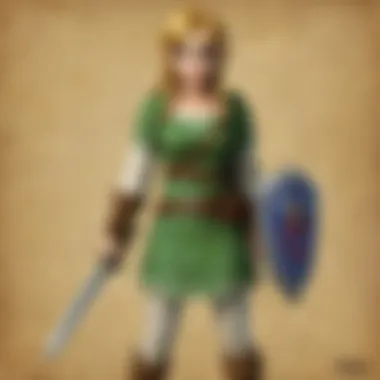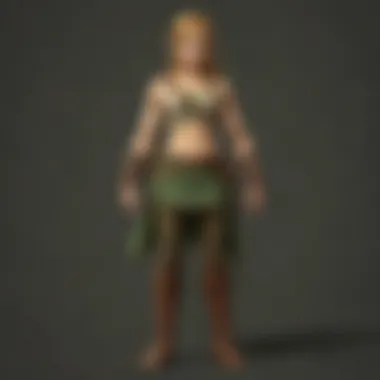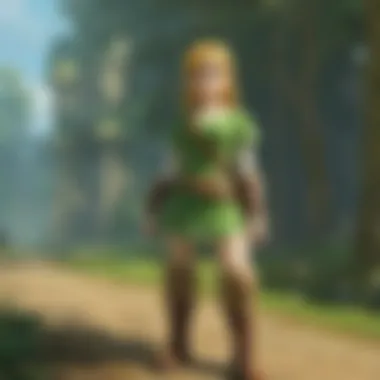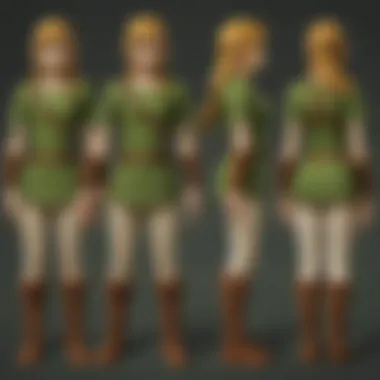Exploring Fanmade Games in the Zelda Universe


Intro
The Zelda franchise has captivated gamers since its inception. Its deep lore, compelling characters, and rich gameplay have inspired countless fans. Among these fans, a subset has emerged that takes their love for the series into their own hands, creating fanmade games. These projects showcase creativity and passion while simultaneously raising important questions regarding intellectual property rights and community dynamics.
In this exploration, we will look at the various elements of fanmade Zelda games. We will review gameplay mechanics, delve into character analyses, explore lore discussions, and provide helpful gameplay strategies. Each section aims to highlight not just the games themselves but also the communities and motivations behind them.
Understanding fanmade games offers insight into the fan culture surrounding Zelda. These projects are often born from admiration for the series, pushing fans to innovate or reinterpret its core elements. It's a fascinating subculture where creativity meets challenges, both legally and logistically. Thus, our journey begins into this rich and varied landscape.
Preamble to Fanmade Games
Fanmade games in the Zelda universe present a unique blend of creativity and passion within the gaming community. This section examines the significance of these projects and their role in expanding the horizons of the Zelda lore. Fanmade creations not only honor the original works but also introduce fresh concepts and interpretations. As more players engage with these games, their importance increases.
Understanding Fanmade Games
Fanmade games are unofficial projects developed by fans. They often draw inspiration from established franchises, like Zelda. These games might utilize existing characters, settings, or plots while adding original elements or mechanics. The development can manifest in several formats, including complete games, mods, or spin-offs.
Creating a fanmade game requires dedication and a deep understanding of the source material. Fans work together, pooling their expertise in various fields like game design, coding, and art. This collaborative effort highlights the strong sense of community that exists among Zelda enthusiasts.
Designing these games also poses challenges. Developers must navigate technical hurdles as they choose their platforms and tools. Software like Unity or RPG Maker aids in development, but mastering these tools takes time. Furthermore, fans must ensure they capture the essence of Zelda. They must know the game mechanics, story arcs, and character nuances that resonate with players.
The Appeal of Zelda in Fan Creations
Zelda, as a franchise, has captured the imaginations of millions. Its rich storytelling and immersive worlds invite fans to engage deeply. The allure of creating something new within this universe is potent. It allows fans to express their appreciation and showcase their talents.
- Nostalgia - Many fans grew up with the series. Creating fanmade games allows for the revival of cherished memories.
- Exploration of Themes - Fans can delve into unexplored themes or characters. This is an opportunity to expand the lore creatively.
- Community Engagement - Fan projects often foster a sense of belonging. Players can connect with others who share their passion.
In essence, fanmade games serve as a tribute to the Zelda series while offering fans opportunities to innovate. Their significance lies not only in entertainment but also in the affirmation of a collective identity within the community.
"Fanmade games are like a canvas for fans, allowing them to draw new stories while respecting the legacy of their inspirations."
This section sets the stage for the exploration of fanmade games in the Zelda universe. It highlights motivations, obstacles, and the inherent joy of contributing to a beloved series.
The Evolution of Fanmade Zelda Games
The journey of fanmade games within the Zelda universe is intricate and revealing. It highlights how the community can shape and redefine a beloved franchise. By examining the evolution of these games, we can understand the cultural and technological shifts that influence creative expressions in gaming. This section breaks down how historical contexts and technological advancements have propelled the development of these fan projects.
Historical Context
The origins of fanmade Zelda games can be traced back to the early 1990s, shortly after the release of The Legend of Zelda: A Link to the Past. This game, with its pixelated graphics and engaging storyline, inspired many fans to experiment with their own ideas. In these formative years, game modifications, or mods, emerged as a popular way for players to reshape existing games. Communities built around forums and early online platforms began sharing their work. This made it easier for fans to collaborate on projects, learn from each other, and foster innovation.
As the years went by, more sophisticated tools became available. Programs like RPG Maker allowed fans who may not have had programming experience to create their own levels and stories. The rise of the internet also played a crucial role in this evolutionary process. Access to resources, tutorials, and forums increased significantly, making it easier for fans to share their creations.
"Fanmade games often reflect the passions and creativity of dedicated players who want to contribute to a beloved universe."
Technological Advancements
With advances in technology, the landscape for creating fanmade Zelda games dramatically shifted. The introduction of more user-friendly game engines, such as Unity and Unreal Engine, provided an avenue for deeper and more complex designs. Fans could now create 3D environments reminiscent of the official titles, offering players a more immersive experience.


Moreover, the growth of game development communities has led to a proliferation of shared knowledge. Tutorials on platforms like YouTube demonstrate techniques for coding, art design, and story development. This has democratized game development, allowing not just experienced programmers but also storytellers and artists to contribute.
The evolution of graphics and sound techniques has also enabled fan games to achieve a level of polish that was previously inaccessible. Enhanced capabilities for sound design mean fan projects can now feature original scores, adding an authentic touch that resonates with players.
In summary, the evolution of fanmade Zelda games is a testament to technological progress and creative collaboration. This journey reflects how players navigate and expand the boundaries of the Zelda universe.
Key Examples of Fanmade Zelda Games
Fanmade games have blossomed within the Zelda community. These creations serve as an expression of admiration for the original series and contribute to its dynamic culture. They not only enrich the gaming experience but also demonstrate the capabilities and creativity of passionate fans. The significance of examining these fanmade games lies in recognizing how they reflect the enduring legacy of Zelda while introducing fresh ideas and perspectives. This section focuses on
- the notable projects that have emerged over the years,
- their impacts on players, and
- the innovative gameplay mechanics that set them apart.
Notable Projects and Their Impact
Several fanmade games have gained attention for their quality and dedication to the Zelda theme. One prominent example is The Legend of Zelda: Breath of the NES, which combines retro visuals and music with modern gameplay elements, creating a nostalgic yet fresh experience. This project rekindles fond memories for older fans while attracting new players.
Another notable title is Zelda: The Lost Oracle. This game took the traditional top-down view and expanded it using original storylines and characters. It offered new puzzles and gameplay hacks that intrigue players. Drawing public attention helped bolster interest in mechanics typically overlooked in the official series.
Each game mentioned manages to do more than just mimic scenes and mechanics. They invite players to reconnect with beloved characters in new contexts, ultimately enhancing the Zelda universe. The resultant community discussions and fanbase growth also showcase the power of collaborative efforts in game development.
Innovative Gameplay Mechanics
Fanmade Zelda games have also introduced several innovative gameplay mechanics. For instance, Zelda: A Link Between Worlds Remake emphasizes the concept of dimensional travel that allows Link to traverse walls. Players enjoy engaging with this mechanic, as it rewrites traditional pathways that demand strategic thinking.
Another innovation found in these projects is in AI-driven enemy behaviors. This goes beyond the original formulas to create unexpected encounters. Such improvements elevate the challenge and excitement for seasoned players.
The combination of these varied techniques opens a space for experimentation. Players often discover mechanics that may not have made it into the original games, yet are crucial for refining their skills and understanding of the gameplay.
"Fanmade games illustrate the unique intersection of creativity and freedom, often leading to developments that inspire official titles."
Overall, the key examples of fanmade Zelda games deliver engaging experiences and showcase the immense talent of the community. They provide invaluable insights into how fan creativity shapes the gaming landscape and reveals the potential for future innovations in the beloved Zelda universe.
Community and Collaboration
The world of fanmade games in the Zelda universe is not just about individual creativity; it is significantly defined by the dynamics of community and collaboration. When fans come together, they create an ecosystem where ideas can flourish. The significance of these communities lies in their ability to support creators, provide feedback, and share resources. These shared experiences lead to richer and more innovative gaming experiences, often surpassing what any single developer could achieve. In addition, the collaboration extends beyond mere support; it cultivates relationships that result in joint projects. This synergy enhances the quality and diversity of fanmade games in the Zelda universe.
Fan communities are essential as they not only unite like-minded individuals but also foster a sense of belonging. For many creators, being part of a community provides motivation and accountability. Enthusiasts often share their work on platforms like Reddit or Facebook, where they receive critique, encouragement, and suggestions for improvement. The fan community serves as a sounding board, encouraging personal growth and technical skill development.
Another important aspect of collaboration is the pooling of various skill sets. Different individuals bring unique talents, from programming and graphic design to storytelling and music composition. This multifaceted collaboration allows for a diversity of ideas and can lead to more polished projects. As a result, projects that utilize a range of talents tend to resonate more profoundly with players.
"In the world of fanmade creations, no one is an island. Every project is a reflection of the community’s collaborative spirit."
In summary, community and collaboration are vital for the success of fanmade Zelda games. They provide a structure through which creativity can be nurtured and realized. Without these collective efforts, many fanmade games may never see the light of day.
Fan Communities and Their Significance
Fan communities play a crucial role in developing and sustaining the fanmade Zelda games scene. These groups are comprised of individuals who share a passion for the series, fostering an environment where creativity can thrive. Within these communities, fans exchange ideas, provide support, and celebrate their shared love of Zelda.


The significance of these communities lies in their capacity to attract diverse talents. Artists, programmers, writers, and musicians come together to work on projects, sharpening their skills and honing their craft. This collective effort often leads to more refined and diversified gaming experiences that pay homage to the Zelda universe.
Communities also create avenues for collaboration, where members can participate in discussions, tutorials, and workshops. This sharing of knowledge is essential for newbies, who can learn from more experienced developers. As individuals share their own experiences, they contribute to a collective wealth of knowledge that benefits all aspiring creators.
Collaborative Development Processes
Collaborative development is a cornerstone of creating successful fanmade games in the Zelda universe. This process typically involves several stages, from brainstorming ideas to the actual programming and artwork.
- Idea Generation: Community members gather to brainstorm concepts. Often these sessions encourage various input, resulting in fresh and original ideas.
- Role Assignment: Once concepts are solidified, roles are assigned based on individual strengths. This ensures that everyone contributes where they can be most effective.
- Regular Updates: Teams often set up regular meetings or online check-ins to track progress. These updates keep everyone accountable and engaged, encouraging a lively development environment.
- Feedback Loops: The collaborative process also involves frequent feedback, where team members review each other's work. This critique cycle helps refine ideas and improve overall quality.
The collaborative development process enhances the creativity and execution of fanmade projects. By pooling resources and skills, developers can create experiences that capture the essence of the Zelda series while introducing new elements that push boundaries. This often leads to innovative gameplay mechanics and unforgettable narratives, reflecting the strength of community and collaboration in the fanmade gaming universe.
Challenges in Creating Fanmade Games
Fanmade games can be seen as an expression of love and creativity within the fan community. However, the journey to develop such games is not straightforward. Understanding the challenges involved is crucial for anyone interested in this aspect of the Zelda universe. These challenges often stem from technical, financial, and creative dimensions. Addressing these challenges can provide insight into the dedication and innovation displayed by fans.
Technical Barriers to Entry
One of the primary hurdles in developing fanmade games is the technical skill required. Many creators lack the necessary proficiency in programming, game design, and graphic creation. Tools like Unity and Unreal Engine are powerful, but they also have steep learning curves. Even accessible tools such as RPG Maker may fall short in meeting the aspirations of ambitious developers.
The process of building a game involves coding, art asset creation, and sound design—areas that require diverse skills and often a team effort. Many indie developers must spend extensive time learning these varied disciplines before even starting their projects. Thus, for many fans, the dream of creating a game can quickly feel unattainable.
Funding and Resources
Securing financial backing can present a significant challenge as well. Fanmade projects often rely on personal funds or modest crowdfunding campaigns through platforms like Kickstarter. These sources may not always cover the extensive costs associated with game development, including software licenses, graphics, and music rights. Without proper funding, the development of the game can stall, limiting the scope and overall quality of the project.
Additionally, sourcing assets legally presents its own difficulties. Talented artists and sound designers within the community may want to contribute, but they also must navigate the fine line between inspiration and use that infringes copyright. Some projects might need to proceed without funds, relying solely on community collaboration.
Navigating Creative Differences
Collaboration is often key to overcoming technical and financial barriers. However, assembling a team leads to its own set of challenges—creative differences among team members can create tension. With various artistic visions and gameplay ideas, reaching a consensus can be complex.
Disagreements may arise regarding character design, narrative choices, or game mechanics. Striking a balance between different ideas while maintaining a cohesive vision can be daunting. Team leaders often need to mediate these disagreements while keeping the project's objectives in mind.
Successful fanmade games often emerge when communication and compromise are prioritized within the team.
Ultimately, understanding these challenges fosters a greater appreciation of fanmade Zelda games. Behind every successful project lies a struggle to navigate through technical barriers, limited funding, and the need for cohesive collaboration.
Legal Considerations in Fanmade Games
Understanding the legal landscape surrounding fanmade games is essential for both enthusiasts and developers. This topic is significant because it outlines the boundaries within which creators can operate without infringing on existing copyrights or intellectual property. Furthermore, being informed about legal considerations helps to foster a safer environment for creativity while mitigating risks involved in producing fan content. The discussion of legal issues must address several key elements, mainly focusing on the concepts of copyright, fair use, and the implications of unauthorized use of intellectual properties.
Understanding Copyright and Fair Use
Copyright plays a critical role in the creation of fanmade games. Generally, copyright protects the original works of authorship, including software, graphics, and character designs in video games. The original creators, such as Nintendo in the case of Zelda games, hold the rights to such creative works. Therefore, using any of their intellectual property without permission could lead to legal disputes.
Fair use is a legal doctrine that permits limited use of copyrighted material without authorization. This concept is sometimes applicable to fanmade games, but navigating its complexities can be challenging. Fair use typically considers:


- The purpose and character of the use, including whether it is for commercial or educational purposes.
- The nature of the copyrighted work, especially if the original work is more creative or factual in nature.
- The amount and substantiality of the portion used in relation to the whole.
- The effect of the use on the market for the original work.
Due to these considerations, fan developers must tread carefully. They should seek to transform their experiences into something new, ensuring that their projects don't directly compete with or replicate the experiences provided by the original games. This careful approach is vital for mitigating legal risks and promoting creative expression within the boundaries set by copyright law.
Case Studies of Legal Actions
Several high-profile cases provide insight into how copyright law applies to fanmade projects. One notable instance involves the Zelda: Ocarina of Time remake by a dedicated group of fans. They aimed to bring a beloved classic to modern audiences using updated graphics and mechanics. However, due to a cease-and-desist letter from Nintendo, the project was halted. The case illustrated how companies closely guard their intellectual properties, discouraging fan projects that tread too closely to their original works.
Another significant example occurred with the fan-developed game Zelda: The Legend of Zelda: Return of the Tri Force. This game was heavily inspired by the original games, but its creators also faced potential legal action from Nintendo. As a result, they had to alter various aspects of the game to mitigate any infringement risks. This action underscores the necessity for fan developers to carefully consider how they can pay homage to a franchise while respecting the rights of the original creators.
In summary, understanding the legal environments surrounding fanmade games is vital for aspiring developers. By familiarizing themselves with copyright laws and the principle of fair use, they can safeguard their projects while contributing to the vibrant Zelda fan community.
Future of Fanmade Zelda Games
The future of fanmade Zelda games is an intriguing topic for both gamers and developers alike. With the increasing technological advancements and growing communities, these projects are on an upward trajectory. This section will explore the significant trends and emerging technologies that are shaping the landscape. It will also look at the community's evolution, highlighting how collaboration and creativity continue to thrive. Understanding these dynamics is essential for recognizing the value fanmade games bring to the gaming ecosystem, especially in relation to iconic series like Zelda.
Trends and Emerging Technologies
As technologies evolve, fanmade games are becoming more complex and immersive. One of the most remarkable trends is the rise of game engines like Unity and Unreal Engine, making it easier for non-professional developers to create visually stunning experiences. These tools allow for more sophisticated graphics and sound design, enhancing player engagement.
Additionally, the integration of virtual reality (VR) and augmented reality (AR) into fanmade projects offers new dimensions in gameplay and story-telling. Developers are exploring ways to incorporate these technologies, making the gaming experience not only more engaging but also more interactive. This opens up possibilities such as stepping directly into Hyrule, creating a fully immersive world.
Other trends include increased use of online platforms for distribution and collaboration. Websites like itch.io provide space for developers to showcase their work, and communities on Reddit or Discord facilitate discussions and project collaborations. With these tools, creators can gain feedback quickly and iterate on their projects.
"The future leans on innovation, and, with communities working together, the cultural significance of these fan projects grows even stronger."
Anticipating Community Evolution
The evolution of the community surrounding fanmade Zelda games is equally important to understand. As developers become more skilled and passionate, relationships formed within these communities often lead to more ambitious projects. Networking plays a pivotal role in this development. Many fans connect through gaming conventions, online forums, and local meet-ups, exchanging ideas and working on joint projects.
Social media platforms, particularly Facebook and Twitter, serve as vital tools for the community. They allow for outreach, sharing of progress, and collaboration requests. Conversations about game design and narrative development spark innovation, pushing projects to new heights.
Moreover, community sentiment tends to favor long-term collaboration. Developers are not just working on standalone projects anymore; many aim to create ongoing sagas. This trend promotes a sense of continuity that is often seen in professional game development. The captivation of participating in larger narratives strengthens the bond among fans and developers.
Culmination
In concluding our exploration of fanmade games within the Zelda universe, it is essential to appreciate the multifaceted impact these creations have on both players and developers. Fanmade games serve as a bridge, connecting creative expression with the established lore of the Zelda franchise. They allow fans to engage with the characters and settings in new ways, thereby enriching their interaction with the overall narrative.
Summarizing the Impact of Fanmade Games
The influence of fanmade games is significant. They often push the boundaries of what is possible within the gaming genre. Through these projects, fans experiment with gameplay mechanics, storytelling, and artistic direction to deliver fresh experiences. Many developers of these fan projects have gone on to create successful careers within the industry, showcasing the talent and innovation that resides in the fan community.
- Creativity: The vast diversity of fanmade games illustrates the creativity within the Zelda fanbase. From intricate game design to rich narratives, fans express their love for the series through diverse projects.
- Community Building: These games foster a sense of community. Fans from varied backgrounds come together to share their passion, collaborate on projects, and celebrate their mutual admiration for Zelda.
The Ongoing Legacy of Zelda in Fan Creations
The legacy of the Zelda franchise is not merely sustained, but invigorated by fan creations. These projects often introduce new interpretations and expansions of beloved characters and plots. They ensure that the essence of Zelda—the values of heroism, adventure, and exploration—continues to resonate with new audiences.
As technology evolves, fanmade games are likely to become even more sophisticated. The tools available make it easier for anyone to contribute to the gaming landscape, ensuring that the spirit of Zelda endures. Moreover, the ongoing dialogue between fans and official developers can lead to greater appreciation and possibly influence future installments of the franchise.
"The community around fanmade games in the Zelda universe not only demonstrates passion but also a commitment to sharing and expanding the Zelda legacy."
In essence, fanmade games encapsulate the heart of what it means to be a Zelda enthusiast. They are more than just projects; they are a testament to the lasting power of imagination and dedication within the gaming community.







